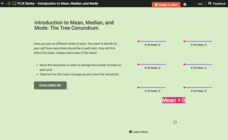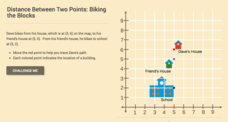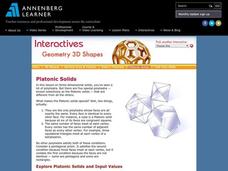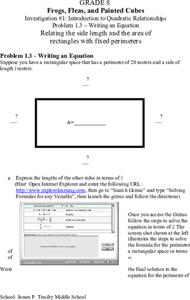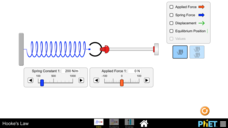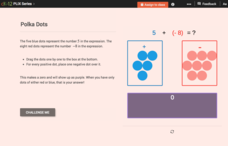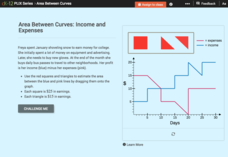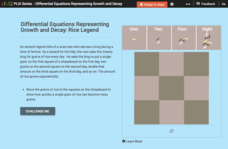PHET
Area Model Introduction
Provide two views of multiplication. The introduction to an area model application has two modes. One mode shows the area of simple multiplication up to 12 by 12. The second mode shows how area models can be partitioned leading to the...
PhET
Balancing Chemical Equations
Just like the old saying goes, "What goes in must come out." This simulation allows pupils to balance chemical equations. The introduction gives three examples before scholars switch to game mode, pick their level, and continue to...
Curated OER
Writing Introductions
In this writing introductions activity, students read about 4 types of introductions, then analyze 6 examples and interactively write comments about each one.
CK-12 Foundation
Introduction to Mean, Median, and Mode: The Tree Conundrum
How many trees should we plant? Using an interactive as a manipulative, individuals find the mean, median, and mode for sets of data. They determine the number of trees to plant in each plot of land to reach a statistical goal.
PHET
Energy Skate Park: Basics
Keep calm and half pipe. An exciting simulation teaches pupils about energy transfer from potential to kinetic and thermal as a skater moves through a half pipe or other track. After a brief introduction, scholars can build their own...
Curated OER
Introduction To Anatomy Quiz
Test your class on anatomy vocabulary words with this quiz. Pupils identify various parts of the human body by choosing the correct term for each given description. This is a basic multiple choice quiz with 10 questions. Class members...
CK-12 Foundation
Distance Between Two Points: Biking the Blocks
Distance estimates would be easy if the world were a grid. Scholars work to determine the distance between two structures using a coordinate plane. As an introduction, the lesson focuses on vertical and horizontal distances.
Concord Consortium
Phase Change
Energize your phase change lesson plans! Add a short but focused interactive into the mix and watch as pupils experience how states of matter react to changes in kinetic energy. The resource tracks the kinetic energy of a cold solid...
Annenberg Foundation
Geometry 3D Shapes: Platonic Solids
From polyhedrons to platonic solids, here is a lesson that will have your classes talking! As an introduction to platonic solids, scholars cut and fold nets to create the three-dimensional solids. They use an interactive component to...
Curated OER
Introduction to Quadratic Equations
In this quadratic equations worksheet, 8th graders solve and complete 7 various types of problems. First, they find the area for each rectangle with a given perimeter. Then, students describe the shape of the graph and use the equation...
Online Math Learning
Divide Fractions by Whole Numbers
After a brief introduction for the objective of dividing fractions bywhole numbers, 10 problems are provided to solve. Hints can be asked for and answers checked on this online activity.
PHET
Hooke's Law
Everything from pens to cars use springs — some are just on a larger scale! An interactive simulation encourages pupils to stretch and compress springs while observing the changes to force, displacement, and potential energy. Then they...
Concord Consortium
Atom and Ion Builder
Explore and control the building blocks of atoms! Physical science superstars add and remove subatomic particles to create atoms and ions with an easy-to-use interactive. An alternate activity includes an assignment that focuses on the...
CK-12 Foundation
Addition of Integers: Polka Dots
What happens when you add negative and positive integers to one another? Do you add or subtract, and will the answer be positive or negative? Young mathematicians use blue and red polka dots to determine the value of an expression that...
CK-12 Foundation
Magnifying Glass
How can a magnifying glass or reading glasses make things appear larger? Scholars simulate moving a lens closer or farther from an object to observe the resulting image. They also alter the lens focal length. The simulation shows the...
CK-12 Foundation
Zero, Negative, and Fractional Exponents: Patterns with Powers
Build a foundational understanding of exponent patterns. Young scholars manipulate the bases of exponent expressions. They discover the meaning of negative exponents through their exploration.
CK-12 Foundation
Division of Rational Expressions: Step by Step
Division just got a little trickier! An interactive lesson highlights the steps of dividing two rational expressions. Young scholars determine the order of the steps from a bank of possible work.
CK-12 Foundation
Trigonometric Form of Complex Numbers
Represent complex numbers in two ways. Pupils use the interactive to convert polar and rectangular representations of complex numbers. The learners drag an overlay back and forth over the coordinate plane to reveal the polar coordinates...
CK-12 Foundation
Seafloor: Sonar Boats
An interactive that teaches about sonar sure sounds like fun! Junior oceanographers study the uses of sonar, past and present, in an engaging interactive. The content demonstrates how sonar works, why sound waves are a great tool...
CK-12 Foundation
Journey to Mars
Why are there launch windows when traveling to outer space? Scholars explore the trajectory of traveling from one planet to another. By adjusting the departure and destination planets, as well as the launch date, they observe the ideal...
CK-12 Foundation
Passive Transport
Some molecules move through a membrane with diffusion while others require protein channels. The video and interactive discuss both types of passive transport. Challenge questions allow scholars to demonstrate their understanding.
CK-12 Foundation
Area Between Curves: Income and Expenses
Use the area of polygons to calculate the area between curves. Pupils calculate areas under income and expense curves by filling the space with squares and right triangles. Using that information, they determine the profit related to the...
CK-12 Foundation
Differential Equations Representing Growth and Decay: Rice Legend
The legend of a wise man who asks a king for rice as a reward presents a context to study exponential solutions to differential equations. Pupils move quantities of rice to a chessboard and calculate the amount of rice for each day. To...
Concord Consortium
DIffusion and Molecular Mass
Does molecular mass affect the rate of diffusion? The simulation allows scholars to experiment with diffusion while varying the molecular mass and temperature. The timer automatically stops when a certain point is reached, making it easy...



